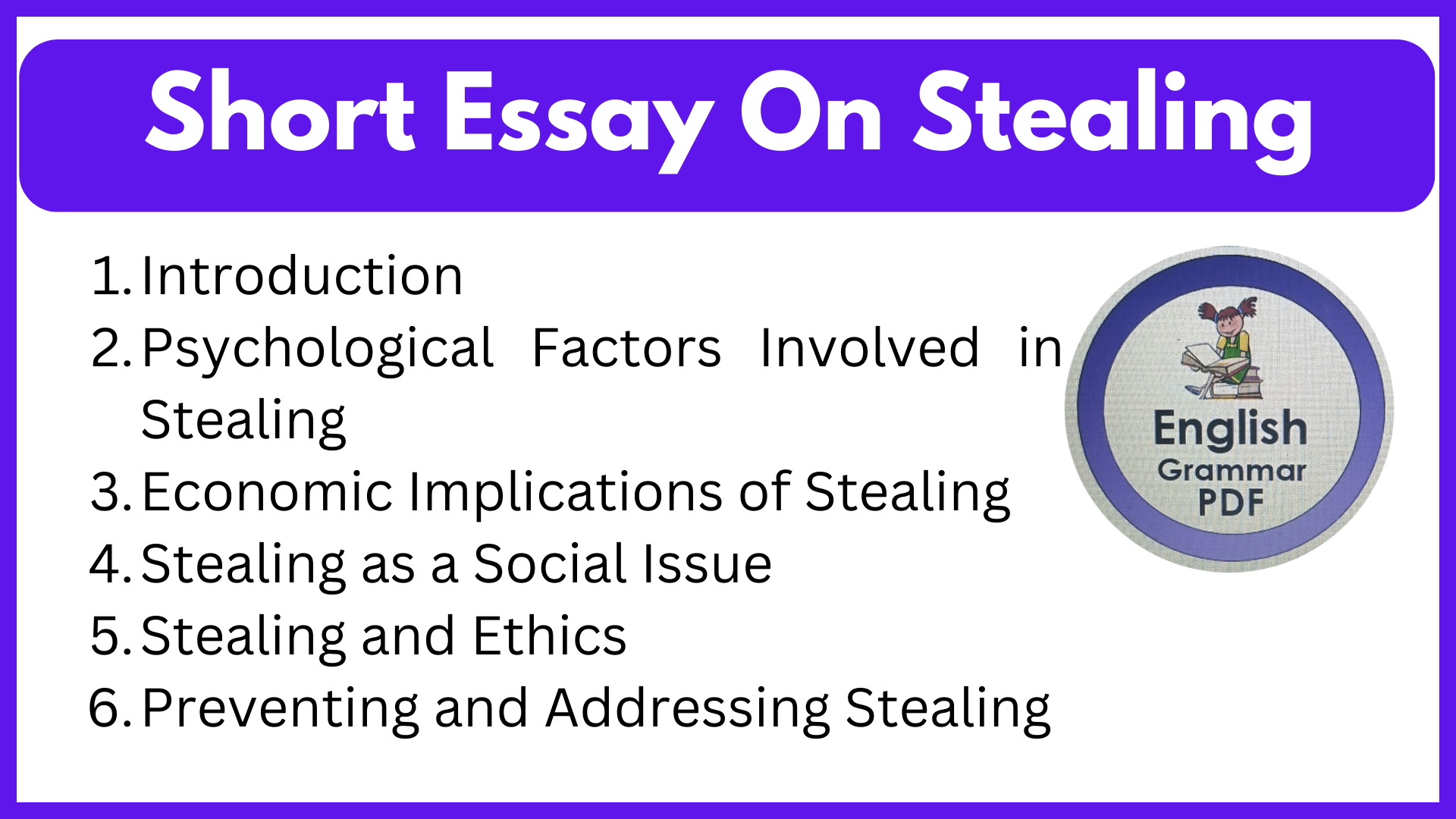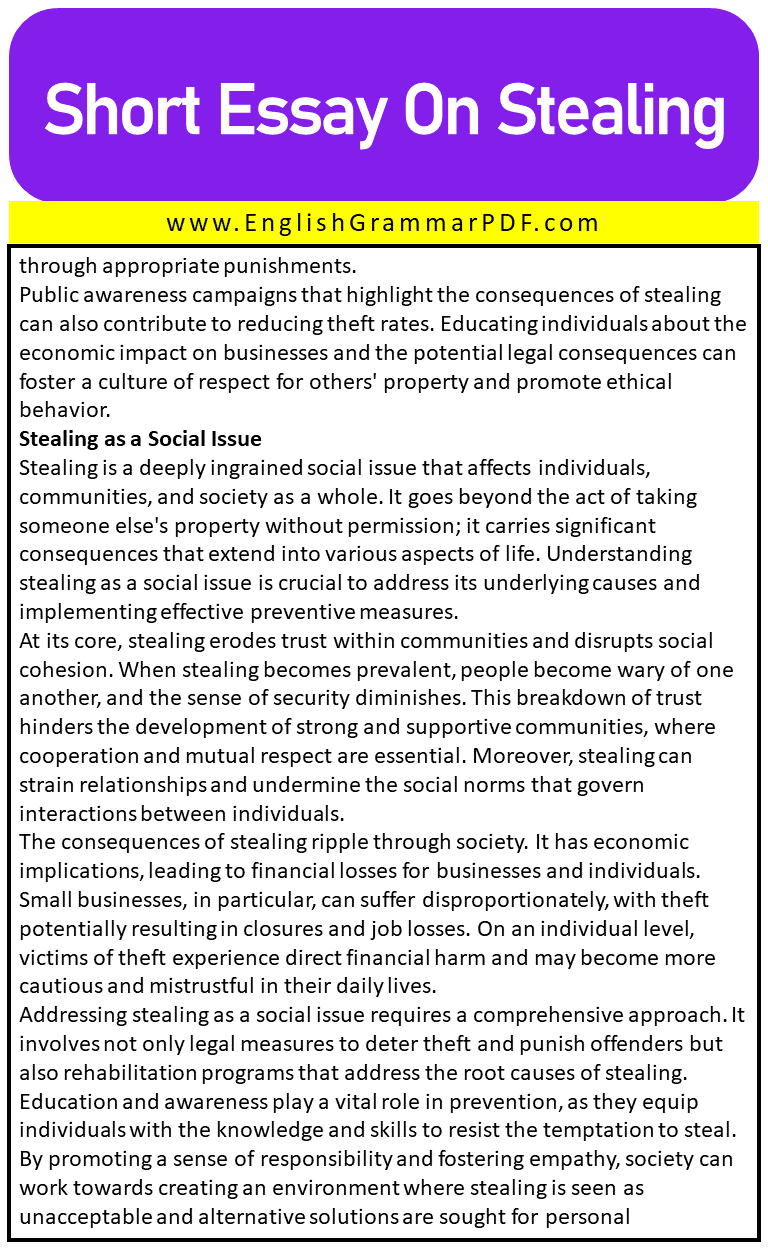Short Essay On Stealing
Outline of Essay:
- Introduction
- Psychological Factors Involved in Stealing
- Economic Implications of Stealing
- Stealing as a Social Issue
- Stealing and Ethics
- Preventing and Addressing Stealing
Introduction
Stealing is a pervasive social issue that has significant implications for individuals, communities, and society as a whole. This essay aims to explore the multifaceted nature of stealing, its historical context, psychological factors involved, economic implications, social consequences, ethical considerations, preventive measures, case studies, and its relevance in the digital age. By examining these aspects, we can gain a deeper understanding of stealing as a complex social issue and identify effective strategies for prevention and addressing this behavior.
Psychological Factors Involved in Stealing
Stealing is often driven by a complex interplay of psychological factors that influence an individual’s behavior. Understanding these underlying motivations is crucial to comprehending why people engage in theft and developing effective strategies to address the issue.
One psychological motivation behind stealing is financial desperation. Individuals facing poverty or significant financial difficulties may resort to stealing as a means to fulfill their basic needs. The pressure to survive or provide for oneself or one’s family can lead to a sense of desperation, pushing individuals to engage in theft as a last resort.
Psychological disorders can also contribute to stealing behavior. Kleptomania, for instance, is a recognized impulse control disorder characterized by the uncontrollable urge to steal, often without any personal gain. Individuals with kleptomania experience intense tension and relief when engaging in stealing, driven by a compulsion that is unrelated to the value or usefulness of the stolen items.
Moreover, social and environmental factors play a significant role in shaping stealing behavior. Growing up in an environment where stealing is normalized or witnessing family members engaging in theft can influence an individual’s perception of stealing as an acceptable behavior. Additionally, socio-economic factors, such as income inequality and lack of opportunities, can contribute to feelings of resentment or the belief that stealing is a justified means of obtaining material possessions.
Economic Implications of Stealing
Stealing has significant economic implications that affect both businesses and individuals. The economic consequences of stealing can be substantial, leading to financial losses, reduced profitability, and increased costs. When businesses experience theft, they bear the burden of replacing stolen goods or repairing damaged property, which directly impacts their bottom line. The financial losses incurred can be especially challenging for small businesses, potentially jeopardizing their viability and leading to layoffs or closures.
On an individual level, theft can have a profound economic impact. Victims of theft often suffer financial losses, requiring them to replace stolen items or repair damages. These unexpected expenses can disrupt personal budgets, leading to financial strain and potential hardships. Furthermore, victims may experience increased insurance premiums or difficulty in obtaining insurance coverage in the future, further exacerbating the economic consequences of theft.
Mitigating economic losses caused by stealing requires a combination of preventive measures and responses. Implementing effective security systems and measures can act as a deterrent and reduce the likelihood of theft occurring in the first place. This includes installing surveillance cameras, employing security personnel, and implementing access control systems. Adequate employee training and awareness programs can also contribute to reducing internal theft within businesses.
Additionally, collaboration between businesses and law enforcement agencies is crucial in addressing and mitigating economic losses. Reporting theft incidents promptly and providing information to the authorities can aid in the recovery of stolen property and increase the chances of apprehending the perpetrators. The legal system plays a vital role in holding thieves accountable and deterring potential offenders through appropriate punishments.
Public awareness campaigns that highlight the consequences of stealing can also contribute to reducing theft rates. Educating individuals about the economic impact on businesses and the potential legal consequences can foster a culture of respect for others’ property and promote ethical behavior.
Stealing as a Social Issue
Stealing is a deeply ingrained social issue that affects individuals, communities, and society as a whole. It goes beyond the act of taking someone else’s property without permission; it carries significant consequences that extend into various aspects of life. Understanding stealing as a social issue is crucial to address its underlying causes and implementing effective preventive measures.
At its core, stealing erodes trust within communities and disrupts social cohesion. When stealing becomes prevalent, people become wary of one another, and the sense of security diminishes. This breakdown of trust hinders the development of strong and supportive communities, where cooperation and mutual respect are essential. Moreover, stealing can strain relationships and undermine the social norms that govern interactions between individuals.
The consequences of stealing ripple through society. It has economic implications, leading to financial losses for businesses and individuals. Small businesses, in particular, can suffer disproportionately, with theft potentially resulting in closures and job losses. On an individual level, victims of theft experience direct financial harm and may become more cautious and mistrustful in their daily lives.
Addressing stealing as a social issue requires a comprehensive approach. It involves not only legal measures to deter theft and punish offenders but also rehabilitation programs that address the root causes of stealing.
Education and awareness play a vital role in prevention, as they equip individuals with the knowledge and skills to resist the temptation to steal. By promoting a sense of responsibility and fostering empathy, society can work towards creating an environment where stealing is seen as unacceptable and alternative solutions are sought for personal and societal needs.
Stealing and Ethics
Stealing is a complex issue that raises significant ethical considerations. At its core, stealing involves taking someone else’s property without their consent, which violates the principles of fairness, justice, and respect for others. From a moral standpoint, stealing is generally considered ethically wrong and is condemned in most societies.
Ethical frameworks provide varying perspectives on stealing. Deontological ethics, for instance, emphasizes the inherent wrongness of stealing, regardless of the circumstances or intentions behind the act. According to this perspective, individuals have a moral duty to respect the rights of others and their property and stealing violates this duty.
Utilitarian ethics, on the other hand, considers the consequences of stealing. It takes into account the overall happiness or well-being of individuals affected by the act. While stealing may bring temporary gain or satisfaction to the thief, it often causes harm, distress, and mistrust within the community. From a utilitarian standpoint, the negative consequences of stealing outweigh any potential benefits, making it ethically unjustifiable.
Ethical dilemmas arise when considering certain contexts, such as stealing to meet basic survival needs or challenging unjust economic systems. In cases where individuals resort to theft out of desperation, some argue that compassion and understanding should be applied, focusing on addressing the underlying issues that lead to such behavior. However, advocating for change in economic systems or engaging in peaceful protest may be viewed as more ethically justifiable alternatives to stealing in such instances.
Preventing and Addressing Stealing
Preventing and addressing stealing is a crucial endeavor that requires a comprehensive and multifaceted approach. Effective strategies must be implemented at various levels, including education, law enforcement, and community involvement.
Education plays a vital role in preventing stealing by raising awareness about the consequences and ethical implications of such behavior. Educational programs can target individuals at risk of engaging in stealing, providing them with the necessary knowledge and skills to resist temptation. By promoting values such as empathy, honesty, and respect for others’ property, educational initiatives can foster a sense of personal responsibility and discourage stealing.
Law enforcement also plays a critical role in addressing stealing. Apprehending thieves and ensuring legal consequences for their actions serves as a deterrent to potential offenders. However, it is equally important to strike a balance between punishment and rehabilitation. Rehabilitation programs can address the underlying causes of stealing, such as financial desperation or psychological disorders, and help individuals reintegrate into society as law-abiding citizens.
Community involvement is essential in preventing and addressing stealing. Communities can establish neighborhood watch programs, encourage vigilant behavior, and promote a sense of collective responsibility for the security of public and private spaces. Engaging community members in dialogue, raising awareness, and offering support to individuals at risk of stealing can foster a sense of belonging and encourage positive social norms.
FAQ’s
Why is stealing a bad thing?
Stealing is considered a bad thing because it violates the rights of others, undermines trust in society, and has negative economic, social, and psychological consequences for both the victims and the perpetrators.
How can I stop stealing?
To stop stealing, it is important to address the underlying reasons behind the behavior. Seeking professional help, such as therapy or counseling, can assist in understanding and managing psychological motivations. Additionally, building a support network, practicing self-discipline, and finding healthy outlets for negative emotions can aid in overcoming the urge to steal.
Explore More Essays:
Essay On Colour Of Personality
Download the PDF of the Essay:








